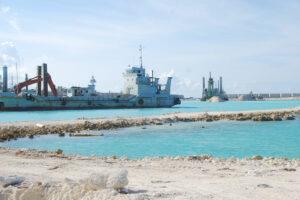Business groups express concern over proposed sovereign wealth fund

TWELVE BUSINESS associations and economic policy groups, including the Makati Business Club (MBC) and the Management Association of the Philippines (MAP), expressed “serious concerns and reservations” over the proposed Maharlika Wealth Fund (MWF), saying it will do more harm than good in the long run.
“There is at present no gap or ‘missing institution’ in the economy that needs to be solved by the creation of a sovereign wealth fund. The country does not have a bonanza of commodity surpluses that need to be deployed,” the groups said in a joint statement signed by the MBC, MAP, Foundation for Economic Freedom (FEF) and Financial Executives Institute of The Philippines (FINEX), among other groups.
“Instead of leaving a legacy of surplus funds to be managed for future generations, the current generation is leaving a legacy of heavy indebtedness that future generations need to pay or refinance. There is no need, or even justification, to pool the reserves of government financial institutions and pension funds into larger amounts in order to earn higher returns,” they said.
Several lawmakers led by House Speaker Ferdinand Martin G. Romualdez, a cousin of President Ferdinand R. Marcos, Jr., recently filed a bill seeking to create a sovereign wealth fund.
The proposed fund will make investments by pooling money from the Government Service Insurance System (GSIS), Social Security System (SSS), Land Bank of the Philippines (LANDBANK) and Development Bank of the Philippines (DBP).
However, the groups said there is no reason why GSIS and SSS funds should be diverted to a sovereign wealth fund “as it would simply expose the members’ retirement funds to investments in assets with additional market and performance risks.”
Under the latest version of the bill, the Bangko Sentral ng Pilipinas (BSP) must contribute 50% of its annual dividends to the fund.
“Instead of putting in more capital to the BSP, the bill, in effect, deprives it of quicker capitalization and in the process, undermines the BSP’s independence and its ability to discharge its role as the country’s central monetary authority and systemic risk regulator,” the groups said.
‘ENOUGH RESERVES’
The Philippines has more than sufficient foreign exchange reserves that can be set aside for a proposed sovereign wealth fund, Finance Secretary Benjamin E. Diokno said, allaying the central bank’s concerns about the plan.
There’s “too much ammunition,” Mr. Diokno, a former central bank governor, told reporters, referring to the foreign reserves. He was responding to questions on whether using the reserves for the wealth fund would hurt the central bank’s ability to use it as a tool against foreign exchange volatility.
Establishing the Maharlika fund won’t affect the Bangko Sentral ng Pilipinas’ independence, he said, adding that the central bank should have a say on how much foreign reserves it will contribute to the fund.
BSP Governor Felipe M. Medalla last week cautioned against the sovereign wealth fund plan, raising issues on governance and the central bank’s independence.
‘POWERFUL STATEMENT’
The House ways and means committee on Monday approved the tax provisions of the fund, which would ensure the tax savings will go back to the investment fund.
“Some P680 million in tax savings will inure to the fund every year as a result of this exemption. That goes towards making the SSS and GSIS funds more robust. That means more funds for pensions,” Albay Rep. Jose Ma. Clemente “Joey” S. Salceda, who chairs the committee, said.
In response to criticisms, Mr. Salceda also proposed safeguards for the Maharlika bill. He introduced an amendment that will ensure all transactions follow the “arm’s length principle and the prudent person rule.”
“This ensures that the fund does not take positions that disadvantage it,” he said.
Mr. Salceda noted the fund would have several layers of accountability, such as the board of directors, advisory board and the joint congressional oversight committee composed of five members from the House and Senate. The proposed board will be headed by the president of the Philippines, and include representatives from government financial institutions and two independent directors.
He also proposed that at least one of the independent directors be an SSS or GSIS member or pensioner, to address concerns about pensioner representation on the board.
Also on Monday, House Senior Deputy Speaker and Pampanga Rep. Gloria Macapagal-Arroyo endorsed the creation of the wealth fund.
“In the current version of the Maharlika Wealth Fund, the President of the Philippines chairs its governing Board. This is a powerful statement that the highest official of the land will hold himself as ultimately accountable to the Filipino people for the performance of the fund,” the former Philippine president said in a statement.
Meanwhile, Philippine Chamber of Commerce and Industry (PCCI) President George T. Barcelon said in a Viber message lawmakers should delay the creation of the fund “due to the funding issue coming from government agencies.”
Mr. Barcelon is the private sector representative to the Legislative Executive Development Advisory Council.
“(We should) put this (MWF) in the backburner in the meantime because we don’t want to do something that might affect our credit standing… With a good credit standing, we do get preferential or lower rates from foreign banks. That is more important for us — maintain our good credit standing,” Mr. Barcelon said in a television interview.
The Philippines currently has investment grade ratings from Fitch Ratings, S&P Global Ratings and Moody’s Investors Service. — Luisa Maria Jacinta C. Jocson, Bloomberg with Beatriz Marie D. Cruz




